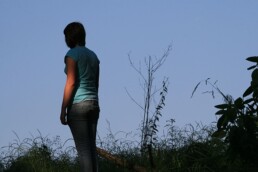While Sweeping
by Kat Patterson |
While sweeping popcorn
I warm to thoughts of last night’s gathering:
good soup and wine,
laughter through the movie,
and all the dishes done.
Normally my broom fetches dog hair,
rarely popcorn or other party leavings.
Sometimes it’s a dead roach I sweep,
Not a welcome guest, but still
it piques my thoughts.
We don’t call them pretty,
no colorful wings, no intricate design.
Instead—frightening, disgusting things,
crawling ceilings, floors and walls.
Hard, dark bodies and mechanical joints
moving cautiously, silently or
escaping quickly with scurrying sounds.
They use vomit to soften their food.
How efficient.
Their heart pumps blood,
not in veins or arteries but in waves
inside the body cavity.
How alien.
Yet their success commands respect.
Their longevity on earth unrivaled,
surefooted on land, flying in air or
flattening through tight spaces,
they survive.
Roaches are not vectors;
like ants they clean the mess we leave behind,
In forests they promote decay,
with worms they create soil—dirt—a basic
for our life, our agriculture.
Their love making takes time—over thirty minutes per act.
Capsules for eggs grow on their tails,
one for each year on their calendar.
After shedding the exoskeleton
roaches are, for a time,
snow white.
If we kill them all
what ecological niches will be left vacant?
Might demons come to fill the gaps?
Would they have liked this popcorn I sweep today?
Probably more with butter or caramel coating.
I leave a kernel in the corner.
Transplant
by Maurie Traylor |
He looked at my nametag and, for a moment, I thought he might remember me. Instead, he glanced down at his purchase, said a terse “thanks,” and handed me his credit card for payment. I smiled, took the card, and ran it through my cash register.
He looked the same. Crisp shirt. Pressed trousers and hip glasses. He didn’t look tired or weary or broken. If anything, he looked more collected and together. I looked down at my ragged fingernails, my work pants stained with the morning’s coffee, and the string that hung from my company-issued work shirt. I wanted to ask, “Do you remember me?” But I didn’t.
I bagged his purchase and asked him if there was anything else he needed.
He smiled the same tight frown that he had smiled at our last meeting. The one that was both a smile and a frown. The one that said, “Something is not quite right here.” I imagined this was the same expression he used when he chastised one of his employees or when he returned his food at his favorite restaurant. “Excuse me,” he would say. “This fish tastes too fishy.”
And his plate would be swept away with an apology and a smile.
“Receipt?” he asked, not looking up at me.
“In the bag, sir,” I said.
If he remembered me from that day, he gave no hint. I watched him take his package and leave.
Relief spilled over me that I was not recognized.
But then, the feelings of shame that were by now so familiar.
Shame that I was almost fifty years old and stood behind a cash register, making less in a year than what I had once made in a month.
Shame that I had risked so much and failed.
Shame that I could not look someone in the eye and say, “Remember me?”
The beginning of the end of my life had started in his office when he quietly told me the reasons my loan was denied. I sat in my business suit, resplendent with black tailored pumps, in a blue upholstered chair across from his massive banker’s desk. We had been there many times before over the years, as I had built my business. But on this day, I watched him as he spoke with my proposal piled in front of him. I saw the long columns of numbers that trailed down the page away from me. I watched him as he spoke the canned speech. My eyes focused on his moving lips, my own lips bent in a prim smile. A sympathetic smile. The type of smile that said, “I know how hard this must be for you, to turn me down like this.” As I listened, my right pointer finger found a frayed edge of the upholstered chair and I pushed it with my nail. Each time he mouthed something, I smiled, and then pushed my finger through the hole a little more.
“Overextended.” Rip. “Can’t justify this loan.” Rip. “Wish we could help.” Rip.
And then he smiled that tight frown and it was over.
Rip. Rip. Rip.
I don’t remember much after that. Whether I shook his hand or left his office or smiled when I passed his secretary.
But I do remember this: I left a small, frayed hole. Like graffiti on a bathroom stall, or a mark on a prison-cell wall. I had been there. I had mattered.
And so, I did what so many like me did during the days of the 2008 recession. I shuttered my business. I talked endlessly with attorneys. I took a series of small, menial jobs that barely covered bills. I unloaded trucks for retailers, I took care of other people’s children, I ran errands.
Currently, I was spending my days behind a cash register, asking perky questions like, “Did you find everything today?” and “Are you one of our Loyal Customers?” as I feigned an enthusiasm I did not possess. At night, I plodded home to my small house and cuddled with Jackson, my Jack Russell, while I watercolored blotchy pictures, drank too much wine, and watched too many reruns of Law & Order. These were the new constants in my life: my dog, my art, and Jack McCoy, getting the bad guys.
At home, I started tending a small patch of earth that sat outside my door. On good days, I would thrust my head into the scent of tangy tomato vines and sniff my fingers after chopping basil. On not-so-good days, I would sit and watch the green leaves reflect the sun in a thousand shades of blue, green, teal, and chrome. Were the colors talking to me? Beckoning me?
Standing in the cool air, watering the plants, it was hard to imagine that other life. It was difficult to imagine the ceaseless activity that, at the time, seemed so important. Weekend business retreats, flights to Dallas, San Diego. These were the days of suits, pumps, and complicated make-up rituals. Now, those days were replaced with a steady, thin line of worry that underlined my grief. How would I make this month’s rent? When was the electricity bill due? Did I have gas in the car?
But mostly the question: “How could I have lost it all?”
On days when that question haunted me most, I filled another pot with raisin-colored soil, pulled a small lettuce plant or kale plant out of its root and placed it another, larger pot. Then, the sun could hit the leaves and the water would move towards the roots. And I thought, “I am like these tiny, gangly plants, waiting for a new place to call home.”
I knew that I was not alone in the recession of 2008. Every day there were new reports of companies that lost their funding, too. Stories of people out of homes and out of work. So why was my loss so intensely personal? Why was my loss so shameful?
Perhaps my place in history was part of the answer. After all, I was of the generation of women that was supposed to have it all. The legacy of the feminist movement of the ‘60s and ‘70s was mine to make good on. It was not enough to simply have a family and nurture that. No, my generation was given—was expected—to keep a home immaculate with all the household gadgets on the market. We were expected to have children excelling in sports and academics and in our spare time? We were expected to create a company or business that would produce, produce, produce.
I was a grandchild of the Depression era, where lack and poverty co-mingled in my family, manifesting in pallets of green beans stacked in my grandmother’s pantry. On Sunday, after church, my six brothers and I stood in line at TG&Y, a coupon for “Buy One Get One Free” in one hand and a fistful of quarters in another. We then dutifully carried our rolls to my grandmother who waited in the car while she read the Sunday paper.
But even then, I was rebellious and risky. One bored Sunday afternoon, my eyes skipped over the whiteness of the toilet paper aisle into the next aisle. Here, colorful pots of paint mixed with the smell of glue and pencils. When my brothers were not looking, I paced down the aisle, like I was discovering a forbidden world of rainbow papers and imaginative inks. Then, a package of markers caught my eyes and held my attention, like the evil Svengali. I fingered the quarters and looked at the markers.
Green, blue, yellow and red. The colors beckoned me to come near.
I looked back at the heads of my brothers, dutifully in line with their white rolls.
And then, I made my move.
I presented my purchase to my grandmother telling her that the store was “all sold out” of the paper and instead I had purchased these. I held up the plastic-encased package triumphantly, banishing the demons of white-paper-roll mediocrity forever.
My grandmother looked at the package of hard, colored sticks and her eyes hardened, lips forming a thin line. My brothers’ eyes—all six pairs—looked down at their hand-me-down shoes.
She did not make me return them. Instead, she meted out the only punishment that I could understand. She made me use them. After that, my cries of “I’m bored!” were answered with my grandmother’s admonishment. “Well, then,” she said, “get out those markers and make something.”
And so I made scrolls and swirls on the backs of used paper sacks during the hazy, hot afternoons of summer vacation, and searched for my redemption from those dazzling coils flowing from the markers’ nibs, the colors tethering me and rooting me in place, upright and free.
I was the one who was supposed to “make good” on the promises of the Post-War boom. I felt the hopes if my entire generation who might finally break through the political constraints of corporate America! I was supposed to have an immaculate home, be a perfect size eight, have well-behaved children and a six-figure income.
I was supposed to thrill my family with evocative dinners and have long, winding, meaningful conversations with my husband that were always encouraging, always supportive.
And all this without breaking a sweat.
How I tried! I kept to the path of sales conferences and monthly production reports. I read self-help books on improving myself, my sales quota, my life. I packed lunches, attended sporting events, tried new recipes, met with teachers, encouraged my sales staff, and gave lip service to the phrase “having it all.”
Instead, I was bone tired, like a field of packed earth that was spent, exhausted, used up.
The end of that first, exhausting, wearying life ended on a July day in Dallas, Texas. Making my way to the convention center, I stepped into a fist of Texas summer heat. I made my way to the meeting room, filled with salespeople milling about. Up until then, I was a noted speaker and considered successful, at least by the company’s standards.
But that year, I reached the year-end celebration meeting with stones in my heart. My sales “numbers,” which were my professional report card, were not good. I was no longer an up-and-coming corporate star but a tired, worn out, middle-aged soldier marching on a corporate battlefield that was changing with the economic stress of that time. The tension in the meeting room was like a tarp that hung over me. As I made my way to my seat, I felt like I was walking under water, with the weight of my failure pushing me down. I looked up and saw an old friend, Maggie, who looked surprised to see me.
I fled to the bathroom while Maggie followed me.
She greeted me nervously. I knew that she knew. My ranking from the previous year was under the charts, a polite term for saying I had failed miserably in my sales goals.
I laughed and stammered a bit. “I know,” I said. “I should probably be home working.”
Maggie laughed. “We all could use a little more this year,” she said in consolation.
We stood together in the refrigerated air of the hotel. I smiled at Maggie.
She smiled back.
And then, I made my move.
My bags were still unpacked and I called for my car and went home.
“Home” was a home in foreclosure. “Home” was a marriage that was failing under the weight of financial stress and consumption. “Home” was a place where two young adults were leaving to find their own roots, somewhere else.
“Home” was a series of difficult talks and decisions. We would sell the house. We would divorce after our second left for college. I would find some kind of work. My husband and I would stay friends. Of course we would.
Of course.
In the days following my return, I spent hours in my garden. I walked the gravel path I had built and I wrote in my journal in bright colored inks. I looked for salvation in the waters pooling as I watered. The drops of water on the leaves shimmered back at me, like a wave.
And then, the colors moved. Bright green shoots of leaves pushing up under the dross of last year’s leaves. How could that color be so intensely beautiful wearing the coat of fall? How could the new growth be so hidden, and yet so real?
I have heard the phrase, “Bloom where you are planted.” But to thrive, a plant must be rooted in the right space, in the right light and soil. And most importantly, there had to be room to grow and nurturing. Had I been planted in the wrong place? Was it failure to re-plant oneself in a new place, one more suited to their nature?
Even now, I’m not sure.
But I know this: I can spread my hands upward to the sky in prayer that says, “Here I am, rooted and strong.”
How to appreciate art in the modern age
by Caleb Hamilton |
Don’t forget the primary goal:
to enlighten,
or lighten
the spirit.
Approach a painting from the top-right corner,
cut a diagonal to the bottom-left,
and examine the borders.
The subject is the absolute last thing you want to see.
For sculptures, identify what appears to be the primary feature.
Ignore it.
Find something more interesting.
Art is in the nuances, the little things.
Concrete poetry
is about as aesthetically pleasing
as the rough gray slop after which it is named.
Leave a palm print on the “visual” installation.
When reading a cartoon,
always chuckle once or twice
(gently, though; laughter is insensible)
and walk away smiling.
But if the comic is political, frown and take a moment. Snort if you like.
Avoid seeming intelligent at all costs.
Above all
you mustn’t read the descriptions
accompanying each work.
You will look silly, as if you don’t understand the masterpiece,
and really those plaques are no help.
Who writes them anyway?
Who could be so pretentious:
that is, who would dare to write a guide on
how to appreciate art?
Poem
by Catherine Larson
I find that age, and mentality, and style, and knowledge,
and most everything in life,
is the same.
Because I cry a lot, and I don’t want to leave my mother,
and I still like stripes and loose jeans and flip flops,
and I still know that you pee in the toilet and you sleep in your bed
and macaroni and cheese isn’t good cold.
You see, fish are red, and yellow, and green.
And sharks are grey and whales are black.
And coral reef is pink, and purple, and orange.
But, the ocean is blue.
And once I was two, and six, and twelve once.
I was once shy, and awkward, and once friendly, and sweet once, too.
I wore cargo pants once, and footy pajamas and my hair in pigtails once,
just like I wore boy jeans once, and neon shoes with neon tube socks once.
And once I learned that apples are red, and that stars make constellations,
and that William Shakespeare was born in Stratford-upon-Avon.
But, I’m sixteen.
I’m blunt.
I like polka dots and white sweaters.
I know it’s the cholesterol in the cell membrane that causes the fluidity and how to solve for x using the quadratic formula and how to cite an article with no given authors.
You see, you turn eleven and you think you’re gonna wake up and be eleven.
People will always ask you on your birthday, “Do you feel different?”
And maybe you say yes to entertain them, but you don’t.
There will never be a birthday that you don’t wake up disappointed in the fact
that you feel the same. You’re ten.
Underneath the year that makes you eleven.
Because what people don’t tell you
is that being eleven doesn’t mean anything,
being sixteen doesn’t mean anything,
knowing cool stuff doesn’t mean anything,
liking black sweaters doesn’t mean anything,
being blue doesn’t mean anything.
You still are what you were and know what you knew and like what you liked.
You aren’t eleven. You’re the years that add up to eleven. Because some days,
you need to be ten and say something stupid. And some days,
you might need to be two and go cry in your mom’s lap. Some nights,
you may feel six and go sleep in your parents bed. And someday when you’re all grown up,
you may need to be fifteen and watch Gossip Girl and eat sour gummy worms
and write your name in hearts with celebrities’.
Because growing up is like mentality,
and style,
and knowledge,
and the ocean.
It’s each thing inside the other that makes it something that means anything.
You don’t feel eleven.
Not right away. And in a few days someone’s gonna ask you how old you are,
and you’re gonna say “ten.”
You won’t say “eleven” until you’re almost twelve.
And then you’re gonna say something ornery, and you’ll know it’s the eleven in you.
That’s just the way it is.
Because it isn’t what you are, it’s what you’re made up of.
And it’s taken a lot of time,
and thinking,
and watching to realize that.
No one tells you
that at sixteen you’re gonna cry because you don’t want to leave home,
or you’re gonna like someone who doesn’t like you back,
or friends are gonna leave,
or that you’ll stay up in the middle of the night
writing about life because you feel like it’s a little too hard and a little too stupid.
But, you are, and they are, and it is.
So, be four when you want to, and be awkward when you want to, and fall in love even when it’s dangerous because sometimes when you look at someone you can tell they’ve lived,
and it’s like magic.
And that doesn’t mean they’ve been to crazy parties,
or drank vodka out of the bottle on Lil’ Wayne’s yacht,
or that they’ve traveled the world,
or even that they’ve met Harry Styles.
It means they let themselves be all that they are
and don’t try to be eleven on their birthday.
And it means that they know macaroni and cheese is bad cold
but they eat it on a bad day because they’re too tired to heat it up,
and they know you’re supposed to pee in the toilet
but they pee outside
because someone dared them to and it’s okay sometimes.
Because that’s what makes life fun
and the ocean fun
and humanity fun.
No one’s just blue.
I’m not just blue, or just ornery, or just white sweaters.
I know things, but, I mess things up anyway,
because solving for x doesn’t work when the formula doesn’t add up.
And what’s the ocean without the fish and the coral and the life?
It’s just blue, and nothing’s fun about being just blue.
I find that age, and mentality, and style, and knowledge,
and most everything in life,
is the same.
Because I cry a lot, and I don’t want to leave my mother,
and I still like stripes and loose jeans and flip flops,
and I still know that you pee in the toilet and you sleep in your bed
and macaroni and cheese isn’t good cold.
Nursery Rhymes With Tertiary, Sort Of
by Hans Pasco
Whadda you mean no fat, no lean
And that you’re gonna lick the platter clean?
Mary has a little lamb
And I have mint jelly. . .
Old lady Hubbard with her cupboard bare
Should have put some of her kids
In an orphanage or up for sale.
Seven, eight, line them straight.
Rock-a-bye baby why are you in the tree top?
When the bough breaks, your cradle’s gonna drop.
Momma might buy you a diamond ring,
But even for your supper you’d do better to sing.
Hey diddle-diddle, cats playing Cajun fiddle
Making the cow jump over the moon,
While the cat in the hat is an old buffoon
And old lady Leary lit a lantern in the shed.
So sit in the corner and eat your plumb,
See your thumb, gee you’re dumb!
The sheep are in the meadow, but
The cows are in the pasture laying chocolate pies.
London Bridge is falling down into the Colorado River,
Coz it’s now out in Arizona.
The mouse ran up Big Ben;
The Tower of London is still there, though.
On top of “Old Smokey” all covered with cheese,
I lost my poor meat ball when somebody sneezed;
One, two, I buckled my shoes,
Three, four, I’m out the door—after my meatball of course.
Raining and pouring and some old guy snoring,
He goes to bed and bumps his head,
Then he wouldn't get up in the morning.
His traumatic brain injury wouldn’t allow for it.
Ring around the rosey, pockets full of posies,
Ashen, ashen,
Sticks and stones may break my bones,
But names will always hurt me.
My Mommy is a Communist,
My Daddy is a spy,
And I’m the little dirty rat
Who told the F.B.I.
Gamble
by Damian Anderson
I draw. . .
slowly, with a soft whistle around,
piles of green, to place on the velvet
I draw. . .
out my glove, reaching forward to meet
that of the dealer, dealing my hand
I draw. . .
my next turn, my hand full of cards,
to play against men, a man’s game
I draw. . .
on ancestral instincts, to help
guide my hands, calmly, “All in”
I draw. . .
on the silent despair, bittered
when I’m matched by excess
I draw. . .
in my breath burning tight,
my face deadpan calm, mechanical
He folds. . .
Church People Like to Touch You
by Jenna Buschmann
Church people like to touch you
They find you, sharks in the water
Smelling the novelty of you
Sniffing at the stink of sin.
They smile at you brightly
Their eyes twinkle, magpie style
Opportunity is knocking
Like a door-to-door evangelist.
They pull you close
“Oh my brother!” “Oh my sister!”
Are we family now? Are we close enough?
Church people like to touch you
Because they long to be touched
By invisible fingers and
Smiled at by invisible teeth.
Mission Statement of the Sacred Mundane
by Corey Jenkins
No one is here but me and the forgotten words of the dead and wise,
and the lost notes of doomed jazzmen.
I read their verse through blue-green eyes, shades of sea and grass and trees,
squinting through Evolution’s bad lenses.
I listened to the lost language of their notes with my third ear to the ground
and my third eye on their poppies.
Like them, I have learned that the mind has locks and molecules, like keys,
can open or close many different doors.
They told me, learn by listening to the hoarse voice of wind through leaves
or by watching the sights of light, endlessly bouncing reality into being
or by huffing the smells of rain on vines that rise above the Monday trash
and by observing your thoughts, then watching them swiftly slither away.
I tip my hat, raise my glass, and pour one for the dead, the lost, or the fun.
I’ll let my wishes for liberty sail along
on the last fibers of a listless and purposeless dandelion seed,
spreading life without volition.
Let me, like the cat, allow curiosity to drive me to the warm fire
of the hearth and the cold womb of the grave.
Some seek sentience in the form of a method or an exercise
or a pill or a plan or a regimen, a list, a lover, a win or loss.
Others seek answers in their work, their war, or their religion,
turning the gears of a global money-press.
But it comes in the transparency of a mind’s stillness
and the empty aroma of clarity.
The smell of diamonds in water that may cut through filters of memory
and the misleading mirages of foresight.
I am a man of life, long-lived in the passion of feeling
that all things and every happening simply Is.
Like a whirlpool in a river, I am but a fleeting form
Spinning out into the oneness of water
with the motions of melancholy cheer.
What Life Became After You Left
by Andrea Aguayo
Dad, Seda keeps barking at unknown sounds and she is due for a haircut soon.
You probably miss her. The rain keeps pouring and
I keep watching happy children with their mommies and daddies every time
I wash and dry clothes at that busy laundromat.
December is here again. I have put up the Christmas lights on our little green tree, but
you are not here to fix the random ineffective, little light bulbs.
Yet I find you in the parking lot where someone left an empty pack of Marlboro Reds.
I smell your cigarettes’ smoke when I have time to
serve Clara some food and she asks for lime;
You ate everything with lime.
I imagine you breathing next to my mom’s sleeping, tired face.
I remember how your snore would let me know
you were home. I keep reading as a hobby when I find the time to treat myself with stories about other selves and I find out
you aren’t the only one who has disappeared. Others are also dealing with
the sorrowful process of merging memories with reality.
I’ve been realizing: This is what life became after we lost you. And the other day
I realized that you are still part of my daily tasks.
I catch a glimpse of you when we are drinking warm cups of Nescafé coffee.
Remember, you loved to prepare yourself a mug of it every morning?
Once more I thought about it, when brushing my teeth. Instead of your Colgate,
I used Crest and I realized you are sold at supermarkets
every single day. You loved saying, “In this life, everything is possible.” Nowadays,
I see you every time my customers watch me scanning
their Marlboro Reds, Nescafés, and Colgates. I run back home
from work to finish checking off my to-do list.
Before leaving the bathroom I catch a glimpse of a girl who once had a father
and I feel so sorry for her.
As soon as I realize the girl is me, I tell myself you live on shelves and inside
shopping bags. You are distributed around the world and
I miss you, but I’m finally accepting what life became after we lost you.
the maps we drew
by Laura Murphy
desert psychedelic blues celebration of vast liberation from sorrow
far-out above and beyond the beyond
human folly and follicular obstacles of limited mammalian vision
primal wondering musing holistically and rhizomatically
in solitude teachers educate our heart of hearts
expanding in unison tugging support strings balancing on galaxies
rooted inner worlds meaning absolute meaninglessness
quiet desperation to Live as we have feared to Live
for the vibrancy of color spectrums and crystallized continuums
blind believers into messy doers tripping on love
falling bowing woven whispering of fearless devotion
ruminating percolating reaching shaking grasping
dreaming Life into fragrant blossomed manifestation
the language of one cosmic breath at a time
perfectly imperfect and words can hardly explain how we feel
and the knowing supersedes, anchoring the guttural feelings
missing the mark yet aiming anyway
crooked arrows pierce ecstatic hearts
we know where our desire guides us
even when we’ve forgotten
the maps we drew together
are we willing to go there
have we faith in ourselves to risk perceived failure
we exclaimed, smartly, “one day we will need these maps”
we thought we would outwit time but did we
or did time benevolently deceive us so we could learn our lessons
sand dunes slip listlessly through obsolete hour-glass receptacles
floating toward bottomless bed-rock pillows like feathers
surreal thunder storming lightening landscapes illuminate
feathers like snowflakes each one unique trembling
fluttering gracefully seemingly with no direction like butterflies
journeying to the full moon circle dance ritual
lift up your hearts in mourning on this morning
all is well
the bigger picture sings resonates orchestrates cohesive elements
marches onward to the heart beat of the Earth Drum
in concert in symphony in cacophony in order in chaos
no need to fear what is bigger than we
yet take heed when wandering in the desert on your vision quest
for the four directions bleed together like an oasis on a canvas
like pigments of a rainy-day mirage










